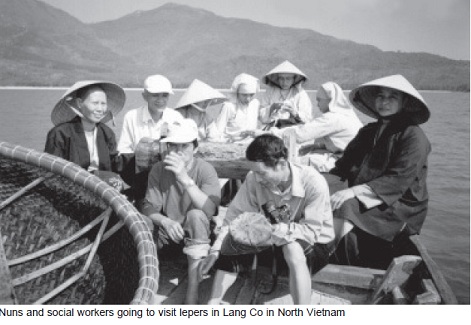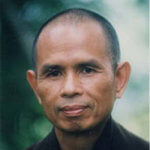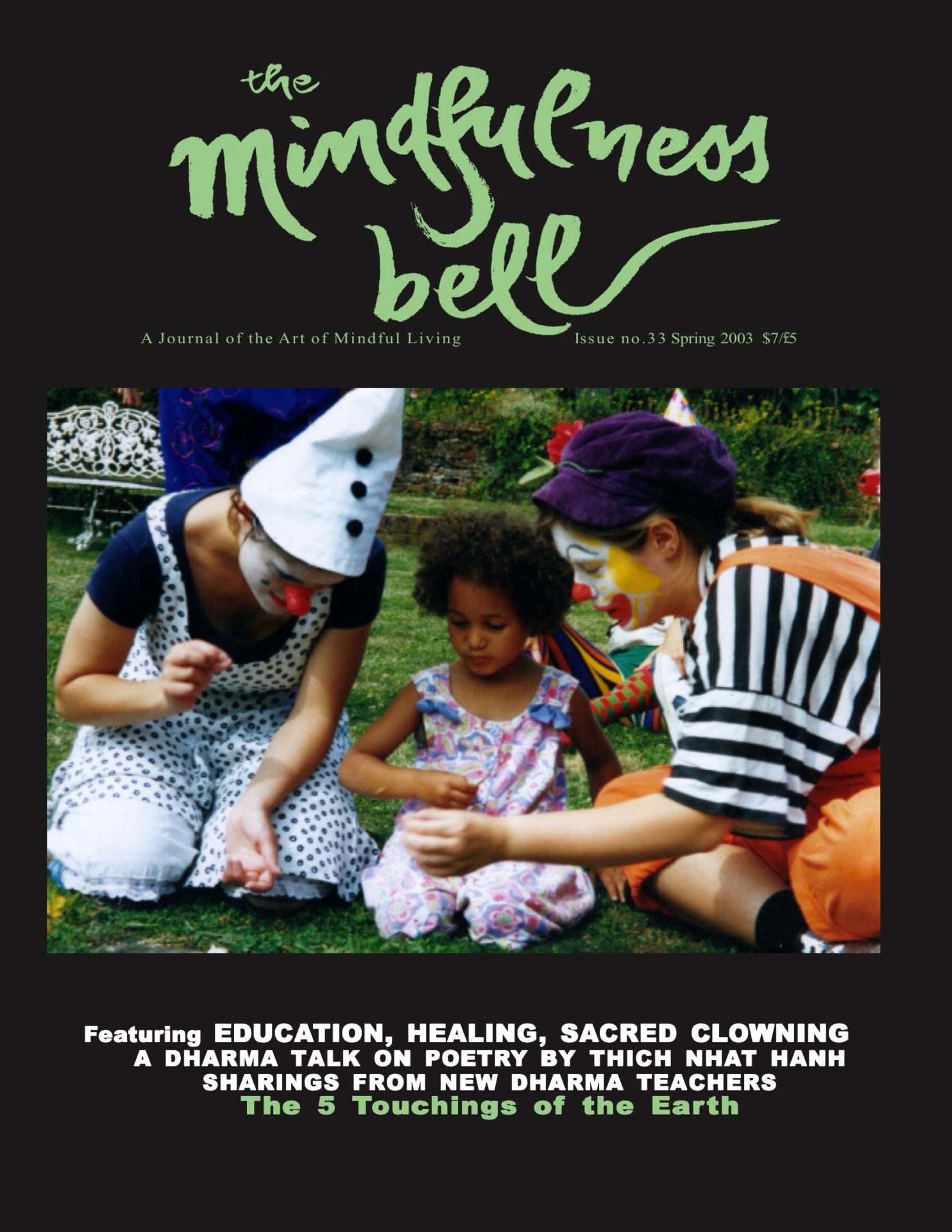A Dharma Talk on Poetry and Interbeing
Offered to Social Workers from Vietnam Visiting Plum Village in May, 2002
Sunshine rides on space and poetry on sunshine.
Poetry gives birth to sunshine, and sunshine to poetry.
Every time we use the expression armful it is usually used to refer to an armful of hay or an armful of logs but rarely do we say an armful of poetry.
A Dharma Talk on Poetry and Interbeing
Offered to Social Workers from Vietnam Visiting Plum Village in May, 2002
Sunshine rides on space and poetry on sunshine.
Poetry gives birth to sunshine, and sunshine to poetry.
Every time we use the expression armful it is usually used to refer to an armful of hay or an armful of logs but rarely do we say an armful of poetry. When people speak about drops they speak of drops of rain or drops of dew or a drop of soy sauce but no one says a drop of sunshine. This poem is an invitation to look deeply in an awakened way and to see poetry as an armful and sunshine as a drop.
Without sunshine how can we have poetry? Without sunshine we would die. How can we make poetry? We feel sunshine also comes from poetry. Poetry is not only pleasant and sweet, it can also be explosive, like thunder. In sunshine there is not only the pleasant image, there is also a strong aspect. Sometimes sunshine is also dry and burning. When we read poetry we feel something sweet and it can also be like a shout denouncing injustice. In these two sentences we can see the interdependence of poetry and sunshine.
Sun treasured in the heart of the bitter melon,
poetry made of steam rising from a bowl of soup in Winter.
I wrote this poem during winter. In the previous summer we grew many bitter melons, more than we could eat. We put them in the freezer and in the midst of winter we took them out and made soup. The bitter melon stores so much sunshine within it. In the winter we could not see the sun at all, it was only gray and cloudy with a cold, sharp wind. We took a log of wood and put it into our stove. At that time in Plum Village we did not have any central heating. We only used wood stoves. We could not see the sunshine outside, but we could touch the sun in the wood log and in the bitter melon in a hot bowl of soup. Even in the depths of winter you know that the sun has never left you. In the warmth inside your home you see the sun in your bowl of soup; you feel the sunshine is still there.
We are eating but we don’t know that we are consuming sunshine. The sun is our father. Without the sunshine not a single being can survive on this planet. All the animals, vegetables and humans on this planet are children of the sunshine. When we eat the bitter melon we are also eating the sunshine. Our father is nourishing us. Without the sun our father we cannot have the Earth our mother and we cannot have food. The sun is our father and the Earth is our mother.
The wind is lurking outside, swirling.
Poetry is back to haunt the old hills and prairies.
Yet the poor thatched hut remains on the river shore, waiting.
When I heard the howling wind outside I thought of Vietnam with many poor thatched roofs. Of course there are also many good houses in Vietnam, but I thought of those families who are most destitute. I thought of the poor thatched roofed hut by the river shore waiting for our support. My mind is in touch with the wood log; my mind inter-is with the material things, the phenomenal world. At the same time, when I heard the sound of the wind, it touches my store consciousness and I remembered the images of our country. When I left Vietnam, over thirty-five years ago, there were so many poor people living in huts like that. My mind is in touch with the bitter melon and then hearing the howling wind my mind touches the image of the day I left Vietnam, with many people suffering under the bombs and now they are still poor and waiting for help.
Spring carries poetry in its drizzle.
The fire sparkles poetry in its orange flame.
Sunshine stored in the heart of the fragrant wood,
Today it is May and we can see poetry everywhere. But in this poem it is not yet Spring, it is Winter and everything is dark, yet I am still in touch with sunshine and poetry in the bowl of bitter melon soup. There is poetry in each drop of rain in Springtime. The poetry is stored in the fragrant wood. If you are practicing, you bring a piece of wood and put it in the fire and you are aware that you are putting sunshine into the stove.
warm smoke leading poetry back to the pages
of an unofficial history book.
An unofficial history book is the book Hermitage Among the Clouds about the true story of Tran Nhan Tong, a Zen teacher in the fourteenth century. During that Winter I wrote that book and I ate the bitter melon soup. My poetry is what I have truly lived. You need to read that book; it is very beautiful. Poetry is everywhere.
Sunshine, though absent from space,
fills the now rose-colored stove.
Sunshine reaching out takes the color of smoke;
poetry in stillness, the color of the misty air.
It seems that sunshine is absent from space, outside it is so dark and gloomy, but sunshine fills the woodstove. When you prepare the stove the heat that radiates out is poetry. The bitter melon soup is also poetry. That is the deep look that is not caught in the form. We have to learn to see things free from the form. When the person that you love is not there you think that he has died but when you look deeply you see that he or she is still there. We complain that there is no sunshine, but sunshine is there in the bowl of green vegetables, sunshine is there in piece of wood.
Spring rain holds poetry in its drops
which bends down to kiss the soil,
so that the seeds may sprout.
Following the rain, poetry comes to dwell on each leaf.
Every drop of rain in Spring enters into the leaf. In a drop of rain there is also sunshine. During the Summer there is a lot of sunshine evaporating the water from all the ponds and lakes, forming clouds. Thanks to the cold air the clouds will become Spring rain. We can say that the rain is kissing the Earth, but we can also say that the sunshine is kissing the soil because the sunshine is in each drop of rain. We see the deep connection between the sun and the Earth. In Plum Village there are so many stinging nettles. In winter you do not see this wild plant. But in spring all you need is the drops of rain and you will see it everywhere. Here in France they call them weeds but they are very good for eating.
Sunshine has a green color and poetry a pink one.
Bees deliver warmth to the flowers from the sunshine
they carry on their wings.
On sunshine footsteps to the deep forest,
poetry drinks the nectar with joy.
With the excitement of celebration,
butterflies and bees crowd the Earth.
Sunshine makes up the dance, and poetry the song.
Usually people say that sunshine is golden yellow, but nobody says that sunshine has a green color. But with deep looking we can see that the sunshine is green. In the poem “Cuckoo telephone” I said that snow is also green. Why? When snow melts and becomes water it makes the plants very lush and green. If we see in a superficial way we only see that the snow is white. But if we look deeper we can see the snow is also green.
When we look at butterflies or bees you can see plenty of sunshine. What do they carry on their wings if not sunshine? Bees deliver warmth from the sunshine to the flowers. The flower has plenty of sunshine. When the bees come and visit the flower the bees bring back honey. Bees deliver warmth to the flowers. If you look deeply you see poetry everywhere; it happens every second and every minute of our life. Things are happening in every moment in May. If you have the time to lie down on the grass you will hear the excitement of spring. Every little being is inspired to sprout. The Earth is crowded with butterflies and bees and many other things. Don’t miss your appointment.
Drops of sweat fall on the hard ground.
Poems fly along the furrows.
The hoe handily on my shoulder,
poetry flows from my breath.
Sunshine wanes away down the river,
and the silhouette of the late afternoon lingers reluctantly.
Poetry is leaving for the horizon
where the King of Light is blanketing himself in clouds.
After being in touch with the beauty we are also invited to be in touch with the suffering. We see the sweat of the farmer who works so hard to grow vegetables for us to eat and we see poetry in that beautiful act of the farmer. The King of light means the sun is going to sleep and he uses the clouds as a blanket. The sun going to sleep is a beautiful atmosphere.
A green sun found in a basketful of fresh vegetables,
a tasty and well-cooked sun smells delicious in a bowl of rice.
If you look at the basket of vegetables but you cannot see the sunshine you are not a good practitioner. Without the sunshine how can you have green, fragrant vegetables? In Vietnam there is a variety of rice called, “eight fragrances rice.” When you taste that delicious rice you know you are tasting the sun. You can see poetry everywhere.
Poetry looks with a child’s eyes.
Poetry feels with a weather-beaten face.
Poetry stays within each attentive look.
Poetry – the hands that work the poor and arid land somewhere far away.
When you are far away from your homeland and you eat some delicious rice you can see the hard work of the farmer; you can see the eyes of children, thin and malnourished. We have seen so many children without enough food. When we eat some delicious rice we see right away the hard work of the peasant and the poor children who don’t have enough to eat. While eating I can see the look of these children.
I remember one day when I was at Kim Son Monastery in San Jose, California there was a friend from the local newspaper, the Mercury News, who came to interview me about mindfulness. The editor wanted to publish an article about mindfulness. This journalist was of Vietnamese origin but she was also very good in English. She asked me, “How can I help you? I am a journalist; maybe I can help you with my talent as a journalist.” That day I was sitting under a redwood tree. She sat next to me and I said, “Please do in such a way that every child in Vietnam will have one cup of soymilk to drink every day. That is my only wish.” There are many of children in Vietnam who cannot grow up healthy and strong for lack of proper nourishment. This morning I received a photo of many toddlers from three to five-years-old taken in Do Linh village, the hometown of my mother which is in a very poor area. I see each child as my mother. My mother was a toddler, poor and undernourished like that. If these undernourished children can grow up properly, as my mother did because she had a good family, they can become a healthy person and give birth to someone like me. If I am a bit thin and small-boned it is because when I was a child I never had a cup of milk to drink. If you can help me every child will have a cup of milk.
Do Linh is just an illustration, but everywhere in Vietnam the poor hungry children could become good mothers if they have a chance like my mother had. Every child in every poor country could be my mother. If you give five dollars per month you can offer a child a cup of milk every day; cow’s milk or soymilk are both helpful. I look at every child in Do Linh as my mother, every child in Vietnam is my mother; every child in Thailand is my mother. I see that every child in Africa and everywhere could be my mother. I wish that every child would have a cup of milk to drink. When you look deeply you can see like that. That is what we call, “attentive look.” Poetry stays within each attentive look. With an attentive look you can see the toddler and you can also see the past and the future of that child. That child can become a strong mother who gives birth to a healthy child or a weak mother who gives birth to handicapped children.

There are farmers that work so hard but it is not enough to feed their own children. You dwell in the present moment but you see far away all over planet. You dwell in the present moment, but you can see the past and the future. Dwelling in the present moment doesn’t mean that you are limited to the present moment.
The smiling sun brightening up the sunflower;
the ripe and full sun hiding itself in an August peach;
poetry follows each meditative step,
poetry lines up the pages.
A person who walks mindfully and beautifully looks like a poem. When you write a compassionate line that is poetry.
Discreetly,
within closed food packages,
poetry nurtures love.
At the time that I wrote this poem it was impossible to send money to Vietnam. It was impossible to reach the poorest children, the elderly people. The government forbade our social work and charity work. The work of the School of Youth for Social Service, that we had set up in Vietnam to help mend the wounds of war, was stopped and the director was in jail. Many social workers were prevented from doing anything. Yet we found a way to provide food to the poorest people in Vietnam. We bought ordinary French medicine. At that moment all Western medicine was blocked from entering Vietnam. So we bought French medicine and each family received one kilogram that they could exchange into 300 kilos of rice to nourish the children. Sister Chan Khong and myself and others wrapped the medicine and sent it everywhere in Vietnam. If the person had the family name “Nguyen” for example, then we would give ourselves that name also. If we put our own names, Thich Nhat Hanh and Sister Chan Khong, the recipients would have been arrested. So we addressed each package as if a family member had sent it. The communist government did not have the ability to check if that person was really in France. We sent thousands of parcels like that to thousands of families. A parcel like that was like a gift from heaven; it could nourish the whole family. We did that work in the wintertime nineteen years ago. We had to use many different handwritings or else the communist government would have been suspicious and arrested the recipients. We gathered twenty persons to write in twenty different handwritings. We included instructions on how to consume the medicine: like that is aspirin or multivitamins do not take more than a certain amount and also how many kilos you can exchange it with for rice. We did that work with a lot of love. We brought a hundred packages to the post office every day. The post office workers said, “You are Santa Claus. But why does Santa Claus come every day and not just at Christmas time?”
With the deep look of a practitioner every moment can be poetry, you can see very deeply and very far while dwelling in the present moment.
Today if I read that poem it is because there are a number of social workers who have come to Plum Village from Vietnam. They have helped me to transmit all of this to the poor people in Vietnam. They have worked in very difficult situations and they have encountered many dangers to be able to do that work.
Translated from Vietnamese by Sister Chan Khong.
To request permission to reprint this article, either online or in print, contact the Mindfulness Bell at editor@mindfulnessbell.org.


